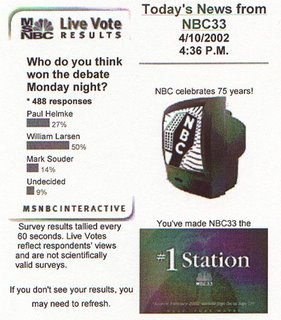What is the True Cost of the Iraq War?
Charlie on WOWO had a guest on speaking about the cost of the IRAQ war and the potential Peace Dividend when the U.S. pulls out. The value thrown out was $300 to $500 Million a day. This is somewhere between $100 Billion and $180 billion a year.
When figuring the cost of the war, how do they do it? Do they do it similar to business practice where a company charges a product line the cost of the building, utilities, labor material, etc? In this case the fixed costs are quite large whether you build a product or not. The military trains and pays personnel daily regardless if they are fighting or sitting in a barracks. They pay to move ships, planes and equipment around the world in peace time. So what is the cost of the war in Iraq? Does it include the cost of wages paid to personnel? If so, would these people be paid anyway? The only ones who would not have been paid are reservists.
Training is a big part of being prepared. During peace time, the navy has ships at sea, the air force have planes flying and the army move tanks and trucks around. Is there an increase in fuel consumption during war, yes? But should the cost of the war be based on all consumables and wages paid in that arena or should the cost be the difference between what would have been spent and what was spent between peace time and war?
I have no idea how the cost is calculated, but I am sure there are two sides; one trying to low ball the cost and the other trying to make the bill as large as possible. I doubt we will ever be able to calculate the cost of the Iraq war.



1 Comments:
Excellent post. You are clearly quite adept at numerical and financial analysis, but frequently you get so involved in your explanation that the main point gets lost on the lay-person reading it. Here, you easily made the point while hardly using any numbers at all.
I think the point you made is true for many areas of government spending. I think that is why so many politicians oppose spending caps, referendums, and basically any other measure that forces them to fully explain the cost of the programs they propose.
It's funny (okay really it's sad) but next year, the nation's governors will be bragging to their constituents about all the great stuff they brought to their states from the federal government's stimulus package. And they can say with a straight face "I gave you all this, and I didn't charge you a dime." Of course, as you pointed out in the above post, the federal government is charging each family over $16,000 for this, and I imagine that most will receive far less than that in return.
It's one big con game, and anything that subterfuges the true cost of each item makes it less likey that the recipient will refuse that item.
Post a Comment
<< Home